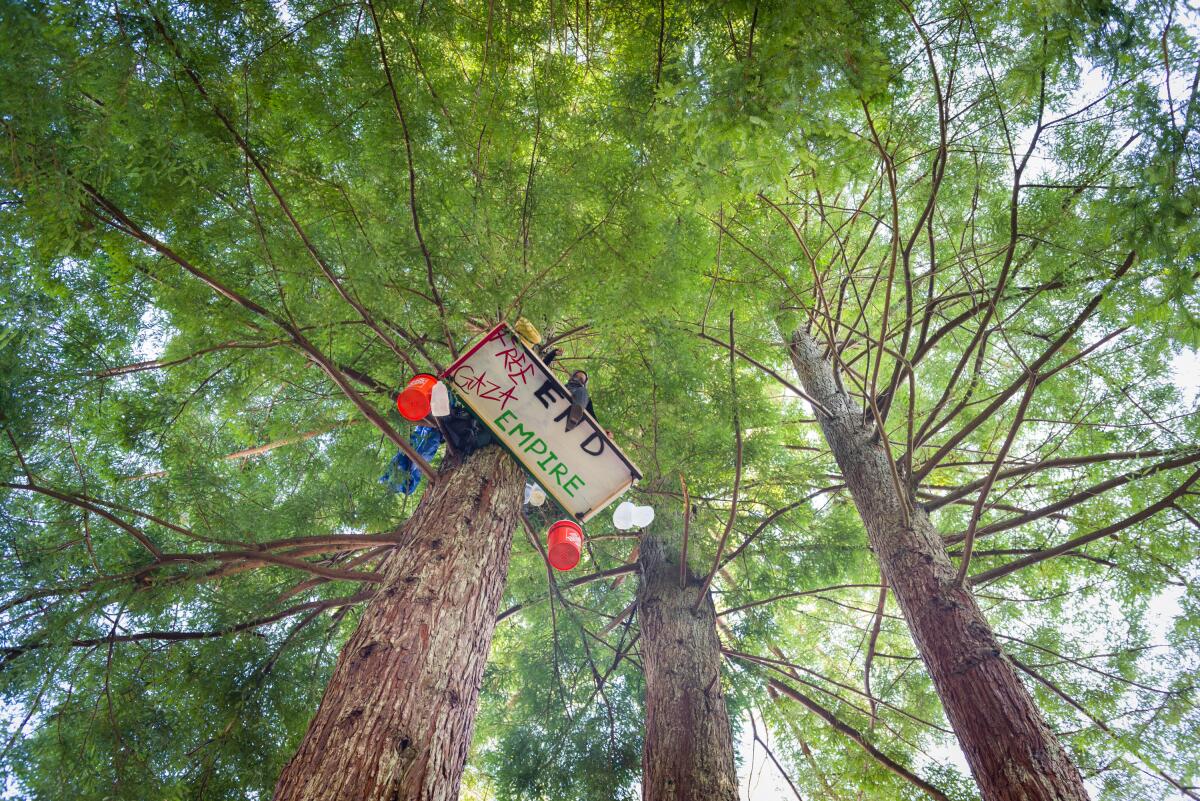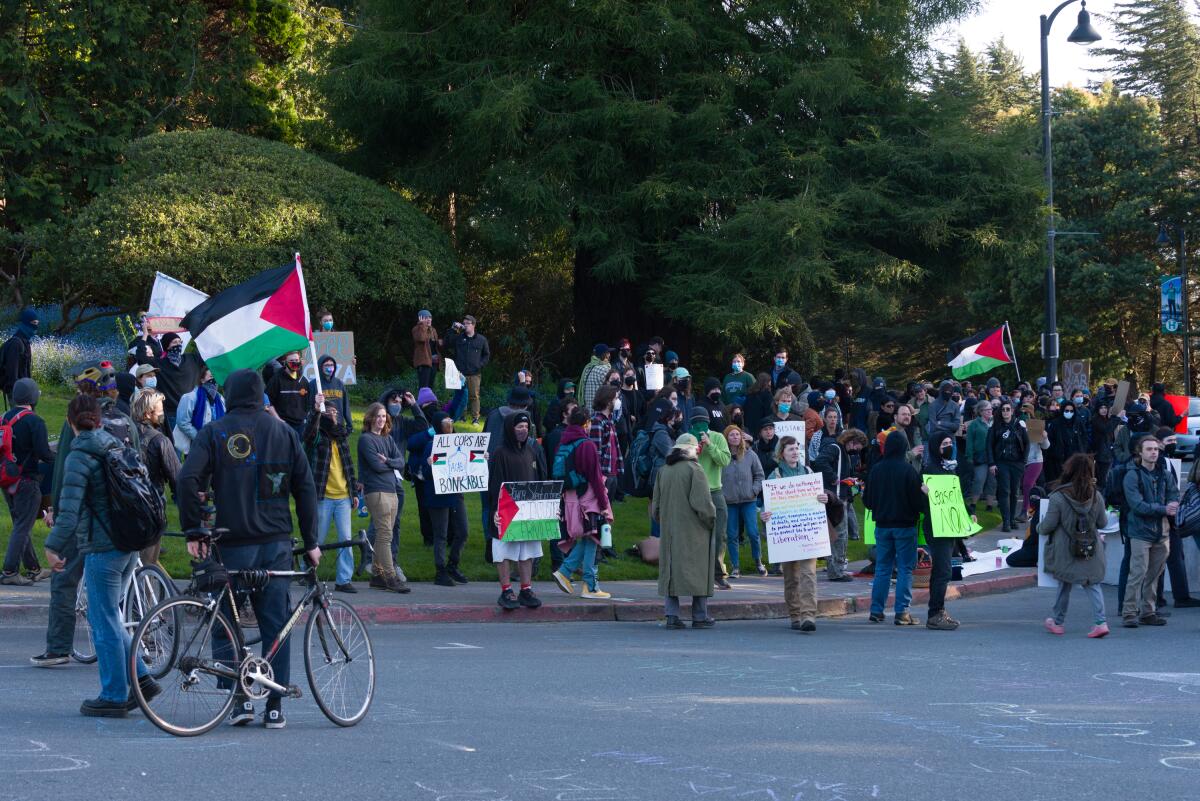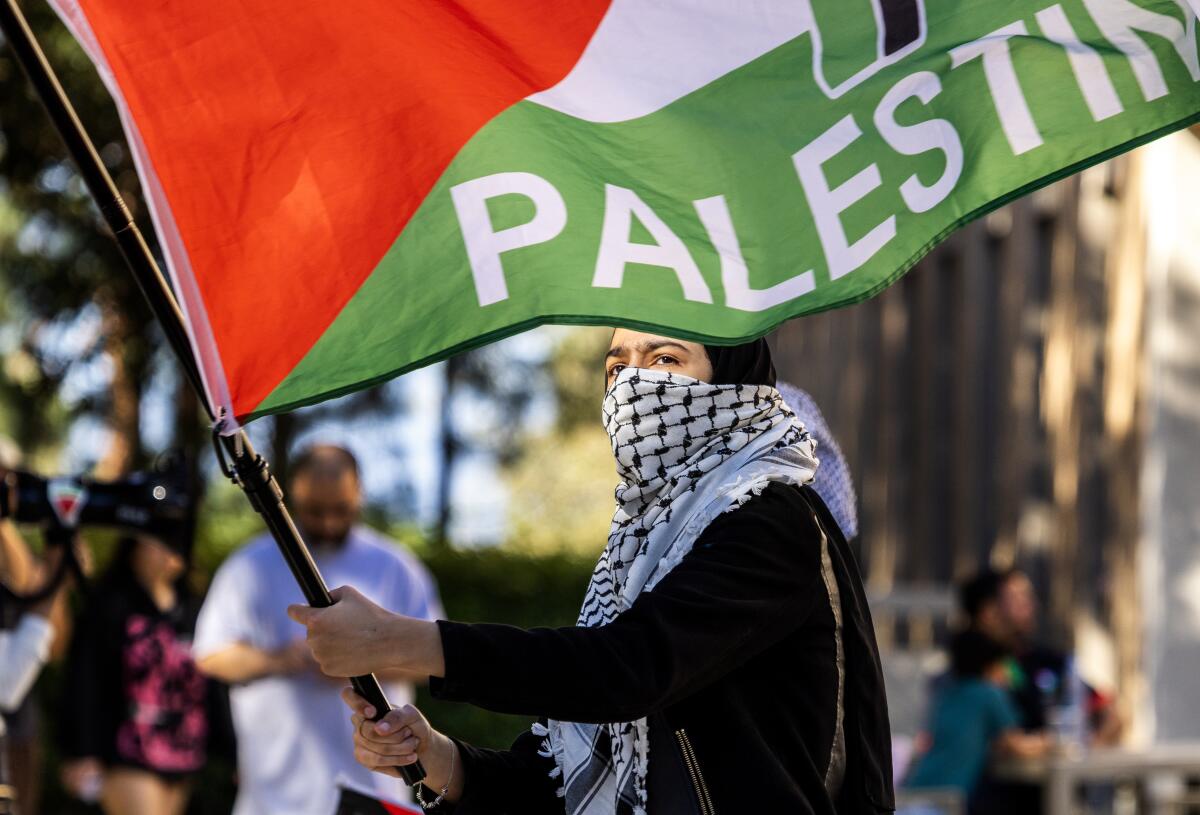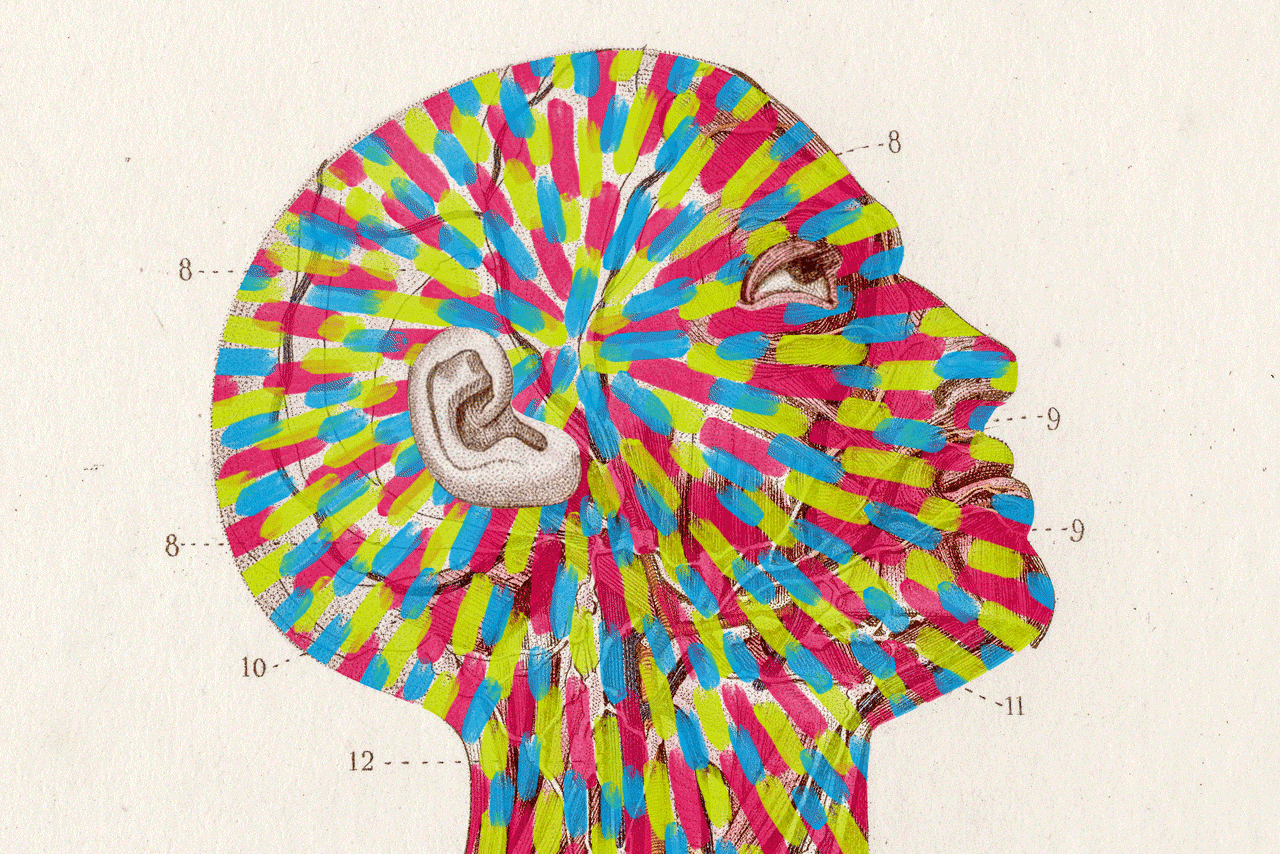Occupation, lockdown, tree sit-in: How Cal Poly Humboldt became California’s epicenter of pro-Palestinian student activism

- Share via
Editor’s note: We’ve tweaked the design of this newsletter to get to the point faster. Let us know what you think at essentialcalifornia@latimes.com.
Good morning. It’s Wednesday, May 1. Here’s what you need to know to start your day.
- Cal Poly Humboldt protests and arrests
- May is off to a wet start in Southern California
- 27 very L.A. ways to spend time with Mom — or not — on Mother’s Day
- And here’s today’s e-newspaper
You're reading the Essential California newsletter
Our reporters guide you through our biggest news, features and recommendations every morning
You may occasionally receive promotional content from the Los Angeles Times.
Protests are not new at Cal Poly Humboldt
In the predawn hours of Tuesday, police arrested at least 25 pro-Palestinian protesters at Cal Poly Humboldt, ending the weeklong occupation of Siemens Hall, which houses the campus president’s, provost’s and dean of students’ offices.
The arrests followed a tense standoff between law enforcement and protesters Monday evening, when police told more than 100 demonstrators to leave. Around 9 p.m., a law enforcement vehicle drove by, announcing that the protesters could be subject to rubber bullets and chemical agents.
The protesters maintained their position as dozens of law enforcement officers in riot gear, clutching guns and batons, marched into the university’s quad and cleared out Siemens Hall. There were no reported injuries.
School officials called Tuesday’s police action “necessary to restore order and to address the lawlessness and dangerous conditions” on campus. They earlier cited “hateful graffiti” and other damage to school property.

“What was occurring was not free expression or a protest,” officials wrote. “It was criminal activity, and there were serious concerns it would spread even further on campus.”
On April 22, students barricaded the entrance of Siemens Hall with chairs and tables and pitched a banner that said “STOP THE GENOCIDE.”
The pro-Palestinian demonstrators are calling on the university to support a permanent ceasefire in Gaza and divest from any investments that connect to Israel’s military or government. Administrators have so far declined.
Tensions quickly escalated among students, faculty and administration, prompting the university to close down multiple times, then eventually for the remainder of the semester.
It is unclear when the university will reopen, though university officials say they are doing everything in their “power to ensure [students] have the opportunity to walk across a stage” during the commencement ceremony, which is scheduled for May 11.
Cal Poly Humboldt’s deep-rooted history of student activism indicates a larger story, one that explains how the university became one of the nation’s leading sites of pro-Palestinian campus protests.
Faculty support
Stephanie Burkhalter is a professor in Cal Poly Humboldt’s department of politics. She’s also been involved in negotiations to peacefully resolve the occupation and meet students’ demands, which she described as “not excessive.”
Burkhalter said faculty have mostly been in a supportive role, offering food and suggesting nonviolent direct action.
She and many fellow faculty members believe Cal Poly Humboldt President Tom Jackson Jr.’s decisions to authorize a police response and close the campus were unwarranted and only escalated the situation. Her voice broke as she expressed respect for students “risking so much.”
“I think they’re incredibly brave, facing all sorts of academic and other types of sanctions to bring this message to the world,” Burkhalter said.
But their activism is spreading, she noted. Three other CSU campuses now have encampments: Sacramento State, Sonoma State and San Francisco State.
Last week, Cal Poly Humboldt faculty returned an overwhelming vote of no confidence in Jackson. More than 300 faculty and staff signed a letter Monday demanding that he and his chief of staff, Mark Johnson, resign or be removed immediately. The letter was sent to Gov. Gavin Newsom, CSU Chancellor Mildred García and other officials.
“Their repeatedly extreme and reckless actions in response to recent campus protests have systematically endangered students, staff, and faculty, undermined the principles of shared governance, and shattered any remaining trust in their leadership,” faculty leaders wrote.
California Faculty Assn. is a union of 29,000 professors, lecturers, librarians, counselors and coaches who teach and serve in the CSU system. The association’s Humboldt chapter is demanding that the university remove academic sanctions and release those arrested because of the protests, said Anthony Silvaggio, the union’s vice president.
“It’s so blatantly obvious that this is just an attempt to criminalize people who are just doing general civil disobedience,” said Silvaggio, who also leads Cal Poly Humboldt’s department of sociology. “There’s no rhyme or reason.”
A tradition of activism on campus
While its enrollment makes it the fourth smallest CSU campus, student and faculty activism at Cal Poly Humboldt dates to the 1960s, taking action in opposition to racial segregation in Southern states, the Vietnam War and other social and environmental justice issues into the following decades.
“This is our campus culture,” Burkhalter said, noting the forest defense movements of the 1980s and 1990s that played out in redwood-rich Humboldt County. That type of activism is still visible on the campus.
“We currently have a tree sitter ... 60 feet up in a redwood tree,” Burkhalter said. “It’s on brand to be committed to important issues and have a response to those issues.”
In 2015, students protested against the unexpected firing of the chair of the Indian Natural Resource Science & Engineering Program by occupying the university’s Native American Forum for a week. The university’s president at the time — Lisa Rossbacher — visited the sit-in and praised the students’ action.
When students occupied Siemens Hall, which Silvaggio called the “hall of power,” he wasn’t surprised, because “that’s where students go to hold people accountable.”
“We have a mission of social justice and environmental sustainability,” he said. “So our students come here, embracing that ethos and ... this is their response to those contradictions and to the atrocities that are committed in Palestine.”
Burkhalter also criticized what she views as Jackson’s lack of engagement on campus. She believes some of his recent decisions — such as barring low-income students who live in vehicles from parking on campus overnight — have fueled dissatisfaction, “leading to the kinds of escalations” that result in protests.
“The excessive police response is an indication of [Jackson] losing touch,” she said. “The distance there is very great.”
As of Tuesday afternoon, Jackson was unavailable for an interview.
Our colleagues Jessica Garrison and Jenny Jarvie also reported on Cal Poly Humboldt becoming a “Gaza flash point.” You can read their coverage here.
Here’s more on campus protests:
- Breaking news: Violence breaks out at UCLA after officials declare pro-Palestinian encampment ‘unlawful.’
- California college campuses become lightning rods for Pro-Palestinian protests.
Today’s top stories
2024 election
- Inside the far-right plan to use civil rights law to disrupt the 2024 election.
- Robert F. Kennedy Jr. says he has qualified for California’s presidential ballot.
- A judge holds Trump in contempt, fines him $9,000 and raises threat of jail.
Weather and climate
- May is off to a wet start in Southern California with cold temperatures and rain over the weekend.
- Summer heat is coming. Here’s a new interactive tool to help you deal with your health conditions
The DEA will reclassify marijuana
- A DEA proposal would classify the drug as less dangerous.
- The big marijuana shift could be a lifeline for California’s troubled pot industry.
Tony Awards
- 2024 Tony Awards: ‘Stereophonic’ and ‘Hell’s Kitchen’ lead nominations.
- Tony nominations reflect a Broadway year in which long shots eclipsed safe bets.
More big stories
- To save Black lives, a panel urges regular mammograms for all women ages 40 to 74.
- Nuclear waste storage at Yucca Mountain could roil Nevada U.S. Senate race.
- The Slamdance Film Festival is moving to Los Angeles with its next edition.
- A thief swipes $1,000 worth of deodorant from an Agoura Hills store, leaves no scent.
- The California Highway Patrol was sent into this California city to crack down on crime. Here is what happened.
- Do dying people have a ‘right to try’ magic mushrooms? 9th Circuit weighs case.
Get unlimited access to the Los Angeles Times. Subscribe here.
Commentary and opinions
- Jonah Goldberg: What we keep getting wrong about protests like those at USC, Columbia and other campuses.
- Editorial: Even with the coming tax and rate hikes, water in SoCal is pretty cheap.
- Gustavo Arellano: The dream of East L.A. as its own city rises again — along with doubters.
- Dylan Hernández: The Lakers have no choice. They must do whatever it takes to keep LeBron James.
- Editorial: Reclassifying marijuana is not decriminalization, but is a welcome step in that direction.
- Robin Abcarian: The women of Trump’s GOP try to answer the question: Who’s the most macho?
- Mark Z. Barabak: Lauren Boebert is her own best asset — and worst enemy — as she fights to stay in Congress.
Today’s great reads
The longest, strangest trip: Some psychedelic drug users are stuck with unwelcome highs. A rare condition called hallucinogen persisting perception disorder has puzzled researchers and raised alarms as psychedelics go mainstream.
Other great reads
- Trapped in an Amazon return box: One Utah cat’s mistaken journey to California.
- Can straight married men and women be friends? I went on a quest to find out.
- Young Latines are leaving organized religion. This divided family is learning to cope.
How can we make this newsletter more useful? Send comments to essentialcalifornia@latimes.com.
For your downtime
Going out
- 🧘🏽♀️ 27 very L.A. ways to spend time with Mom — or not — on Mother’s Day.
- 🛍️ Eight L.A. happenings in May to get you ready for summer.
- 🎤 Billie Eilish is launching Hit Me Hard and Soft tour this fall, sets three Forum shows.
Staying in
- 🍓 Here’s a recipe for strawberries and crème.
- ✏️ Get our free daily crossword puzzle, sudoku, word search and arcade games.
And finally ... a powerful photo
Show us your favorite place in California! We’re running low on submissions. Send us photos that scream California, and we may feature them in an edition of Essential California.

Today’s powerful photo is from Times photographer Gina Ferazzi at a pro-Palestinian demonstration on UC Irvine’s campus.
Have a great day, from the Essential California team
Defne Karabatur, fellow
Ryan Fonseca, reporter
Andrew Campa, Sunday reporter
Kevinisha Walker, multiplatform editor and Saturday reporter
Christian Orozco, assistant editor
Stephanie Chavez, deputy metro editor
Karim Doumar, head of newsletters
Check our top stories, topics and the latest articles on latimes.com.
Sign up for Essential California
The most important California stories and recommendations in your inbox every morning.
You may occasionally receive promotional content from the Los Angeles Times.











